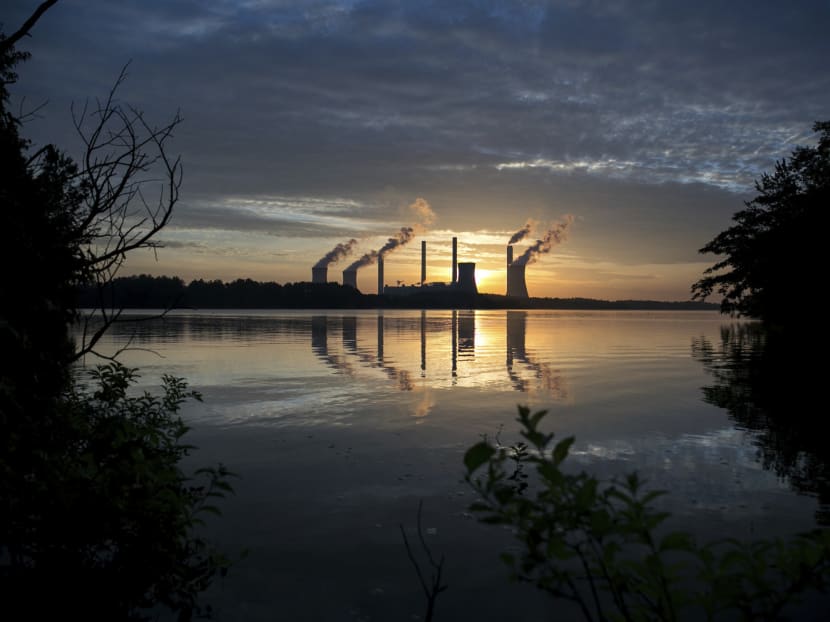With US out of climate pact, others have to do more with less: DPM Teo
SINGAPORE — With the United States pulling out of the global Paris climate agreement and stopping contributions to a climate change fund, Deputy Prime Minister Teo Chee Hean said yesterday he hopes that international cooperation on this front will continue.

The coal-fired Plant Scherer, one of the US' top carbon dioxide emitters. US President Donald Trump declared June 4 he was pulling the US from the landmark Paris climate agreement, striking a major blow to worldwide efforts to combat global warming and distancing the country from its closest allies abroad. Photo: AP
SINGAPORE — With the United States pulling out of the global Paris climate agreement and stopping contributions to a climate change fund, Deputy Prime Minister Teo Chee Hean said yesterday he hopes that international cooperation on this front will continue.
On its part, the Republic will continue training overseas officials in key areas such as sustainable urban and water management because “that’s the area (in which) Singapore thinks it can make the biggest contribution”.
The Republic benefited most from the knowledge of other countries when it became independent from Britain and, later, Malaysia, said Mr Teo, who was speaking at Temasek Holdings’ annual sustainability conference.
In support of the United Nations 2030 Agenda for Sustainable Development, Singapore has trained more than 112,000 officials from over 170 developing countries, and will continue to do so, Mr Teo added.
During a question-and-answer session after his speech outlining Singapore’s efforts in sustainability, Mr Teo was asked by the moderator, Professor Chan Heng Chee, what he thought would be the consequences of the US pulling out of the Paris Agreement.
In response, Mr Teo noted that the accord — ratified by 147 countries so far — is operative even without the US, which contributes about 18 per cent of the world’s greenhouse gas emissions. The US was a significant contributor to the Green Climate Fund, which is used by developing nations to mitigate and adapt to climate change.
“It remains to be seen how the books will be balanced in terms of contributions”, he said. “I think in the end, we may have to do more with less, and that’s part of being sustainable too.” The “big story” however, is how the economics of generating electricity is driving towards natural gas and renewables, he added. The cost of generating electricity from renewable energy or shale gas in the US is now lower than coal, he noted.
Singapore remains committed to the Paris Agreement but it is not a contributor to the Green Climate Fund.
Mr Teo was also asked by Professor David King — the United Kingdom’s former permanent Special Representative for Climate Change — if Singapore would chip in for the fund, which was established under the United Nations Framework Convention on Climate Change (UNFCCC).
Governments of 43 countries, including Sweden, Norway, the United Kingdom and Japan, have pledged US$10.3 billion (S$14.2 billion) to the fund. The US has contributed US$1 billion out of a US$3 billion pledge.
Mr Teo said there was a wider debate — on common but differentiated responsibilities of developed and developing countries — going on, than “whose pockets and which pockets seem to have coins jingling in them and can be drawn upon”.
He noted that newly developed and developing economies “quite correctly” say that global warming is because of the carbon dioxide already in the atmosphere, and they argue that developed countries thus have a greater responsibility to deal with the problem.
“And one of the reasons why there’s this Green Climate Fund ... because that’s a way to bring on board developing countries, allow them to develop in a way which the developed countries did not, in a much greener way, without putting out so much carbon-dioxide into the atmosphere,” Mr Teo said.
“The developed countries would, in a sense, make up for the current stock of carbon dioxide in the atmosphere by making contributions to the Green Climate Fund. And that was part of the balance and part of the equation in arriving at the Paris agreement to bring everyone on board.”









